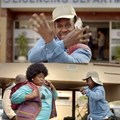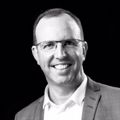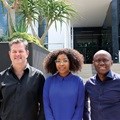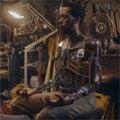#BehindtheSelfie with... Bogosi Motshegwa

1. Where do you live, work and play?
I live in Braamfischerville, which is an RDP housing development area that was built post-1994, in the dawn of the new democracy. Most people don’t know where it is, to make it easy, I say I live near Dobsonville.
I work for Net#work BBDO now. Before that, I was at The Creative Counsel (TCC). Great experience. Net#work is still a new gig. I started here on 1 November 2017. It’s challenging here, which stretches the mind and expands my level of patience.
2. What’s your claim to fame?
I’m not sure if I have done anything of significance, I guess it would depend on what metric I use. Our industry is predicated on tangible signifiers (awards) that allude to some sort of noteworthy contribution. My personal measure of any significant contribution is having an impact on or contributing to business, both for clients and at the agency, whether it’s in winning new business or resuscitating a wounded client/agency relationship, I take pride in that.
But to answer your question, there are two aspects: internal and external. Internal would be from the agencies’ point of view (where I’ve worked), and external, which is from an industry point of view, which is much broader and beyond the parameters of my workspaces. My claims to fame are from a personal perspective and may be things that may not mean much to many, but I feel are significant.
For example, I’ve never won a strategy-related award, but I feel fulfilled in what I’ve been able to achieve.
I’ve contributed to my previous agencies winning new businesses. In the grand scheme of things, at the core of what I do, is exactly that: to bring in new business and help grow current clients’ businesses.Any topiece of work out of an agency is collaborative, but I’ve significantly contributed to wins on a couple of pitches, I’ve won new business based off of the work that I’ve produced. When clients start to trust you with other brands in their business, based on a particular project, it is fulfilling. And these are things that aren’t rewarded easily.
Form an external or industry’s point of view, my articles on Bizcommunity and other similar platforms have been a great experience. I always get pleasantly surprised when I meet someone for the first time and they acknowledge one of the articles that resonated.
I think we need more industry people saying more and sharing their ideas and thinking.
3. Describe your career so far.
Nothing short of interesting. I learn every day. I think I’ve done fantastically so far, but I say that with caution. I believe that there’s still a lot that I want and need to do. To achieve. To have a meaningful impact. Mostly, it has been a learning experience.
Every day I take as a learning opportunity. I refrain from thinking that I am the smartest in the room or that I need to drive the direction of the conversation. Every time I walk into a boardroom, there’s the inevitable expectation to add value and contribute, but I have a different agenda.I’m there to listen. By the time I speak, I think I have something to contribute because I have some sense of how everyone thinks. Being still and observing is an underrated skill in our industry.
So far, I think I’ve contributed in my own small way to the agencies I’ve worked at. My first pitch at McCann was a success. There was a great team around me, of course, but I’d like to take it as a personal victory. As mentioned above, there are no awards for winning business, haha! I think I contributed to TCC as well on a couple of new businesses and added value immensely in some instances.
As a strategist, my role is to add value to both client and agency respectively, and I don’t think that I have done that badly.
4. Tell us a few of your favourite things.
Lil Wayne, Lil Wayne, Lil Wayne.
But seriously, my favourite things make me happy, so I’m going to reframe the question to what makes me happy:
- Seeing others succeed
- Teaching and sharing knowledge where I can – hence I love to give lectures and I’ve lectured at AAA, the Amasa Media Management course, Vega, Rosebank College, and Red & Yellow JHB
- Talking about advertising and the lack of transformation. This is an everyday conversation. The struggles are real for black creative professionals and we cannot ignore them
5. What do you love about your industry?
As I keep growing and experiencing the industry more, I begin to realise that much like the concept of the Rainbow Nation, the industry is incredible in theory, but a different story in practicality. I’m beginning to sober up from the honeymoon phase of this advertising industry relationship. It’s real.
In theory, I love what we do, I love the idea that we are creative, I love the fact that in theory, we can do whatever we want, I love the fact that we seem to be flexible. Unfortunately, the reality is different.We are like any other business or industry. We are governed by the same rules that govern most industries and the principles of business.
We can talk about how creative we are, but at the end of the day, we need to make profits, and unfortunately, that determines how we experience the industry. There are a lot of people involved and factors that get in the way of creativity. It’s unfortunate.
I think that we must be one of the most stressed out people when compared to other industries. It is in retrospect that we post-rationalise the fun and excitement of the industry. We are overworked and underpaid. Day-to-day, there is nothing glamorous about what we do, if there is, it happens sparingly and the exciting moments are few and far in-between.
I love the theory of what we do, or at least what we are meant to do. The industry is not conducive for happiness, unfortunately. But I’m a sample of one, perhaps others have a different view, but I have a strong feeling that many share this sentiment.
Young creatives are sold the idea of ‘an exciting industry’, without an appetising financial conversation. Advertising's hype is not real. Maybe it is for a few, but for the majority who genuinely want to create great work and earn an honest living, the industry is a lie.If there’s anything that I love about my job it would have to be the potential to be creative and the huge task we have of saving lives. There is a saying that we don’t save lives (an attempt to calm ourselves down, that no-one is going to die), but I strongly believe that we do save lives. Our job is very important.
Brands that are not active, not producing great work and not attracting people’s desire to spend stand a great chance of losing. If we don’t do great work that positions brands in favourable ways, companies will lose and therefore people may lose their jobs. This is not just advertising, we do save lives.
6. Describe your average workday, if such a thing exists.
Absolutely, we do have average days, but those are like unicorns. When you find them, please take a pic and tag me on Facebook.
My days are unpredictable. No average day. I could go to sleep with a clear diary for the next day, but wake up with having to travel to Cape Town and back on the same day. The unpredictability is an inherent attribute of the industry. It’s fast-paced, and you have to always be on your toes. Be ready for anything.Sometimes, I find that I spend most of my time travelling or in meetings, and therefore literally left with no time to do actual work. It’s funny that we sell time to clients, but there really isn’t any to work with.
7.Who is getting it right in your industry?
This is quite a broad question with no parameters to navigate around. I’m not sure what criteria we are using to definitively say who is getting is right. What are they getting right? Below I’ll speak to a few concepts that I feel are critical in the industry, say who is getting it right in that regard, and then explain why I think so:
Transformation: M&C Saatchi Abel is getting it right, I think. Transformation is quite a broad concept, but based on the business strategy and how they approach their growth as a business, it’s quite admirable. I’m not sure what making partner in advertising means.
Whatever it means, whether it means acquiring shares in a business or having some sort of decision-making power, I love it. It’s still a new concept for me, and Mike Abel is spearheading it.
Other agencies worth noting: Collective ID. Congratulations to Makosha for making partner. Most agencies have tried to ‘buy’ their transformational status.
Creative Leadership: I only met Ahmed Tilly once, and it was at FCB reception where we just greeted each other. I haven’t worked with him before, and this purely on what I’ve heard from him, and in analysis of the work he did whilst at Black River FC.
I believe that he is the epitome of great creative leadership. He doesn’t just lead the work, but the people, too. It’s one thing to be a creative genius, but magic to be able to lead people into their own creative potential.
Creativity: FCB and Ogilvy, it goes without saying, especially for the work on DStv. King James has done some really exciting work, their Sanlam work was particularly inspiring, I loved it because I felt that it was driven by strong strategic thinking. Joe Public has also been on a really good marathon of exciting creative work. From FCB, I enjoyed their Toyota work. Xolisa and team are doing great work at Joe Public – the new Chicken Licken TVC is really cool.
Not forgetting VML, which has also done some exciting work. Jason must be proud!
It would be a sin not to mention The Odd Number. Sbu and the team have consistently shown their creative prowess in a short space of time. Well done to them.
Growth and success: Avatar has been splendid at this. Their growth is nothing short of inspirational. As they’re two black guys who started really small, to see their growth is something special.
Closer to home, before I left McCann, the agency was on a growth trajectory. This is incredible from an agency that was deemed to ‘failing and faltering’. I’ve been in boardrooms and meetings where success was discussed, and it’s great to see the success. Joe Public has also grown exceptionally. Kudos to Pepe and the team. Before I left TCC, Ran had a great strategy for TCC, and I believe that with its application, TCC will be unstoppable!
What is interesting is that no single agency or individual has figured it out. Those who are doing well creatively may be lacking from a transformation point of view. But we have to give credit where it is due. In all of the agencies and people mentioned, the common golden thread is the deliberate intent to succeed and to get it right.
8. List a few pain points the industry can improve on.
Flexible hours: We are supposed to be creative, but we are confined to work within the same working hours as people in different industries. We all know that we don’t really work from 9am to 5pm, #BecauseAdvertising.
Doc told me stay at home because I'm sick, and here I am awaiting a concall. #BecauseAdvertising
— Mikka Wee (@mikkawee) April 20, 2017
I personally don’t believe in getting to work at 9 and leaving at 5. Firstly, traffic, why would I drive out when everyone is on the road? Secondly, and most importantly, creativity doesn’t work that way.We need to work flexible hours. It honestly doesn’t make sense to expect everyone to work the same way, same hours and expect incredible work. We currently work the same way as traditional schooling.
This sort of thinking assumes that we all function the same way, that we are inspired by the same things and that we get work done the same way. Flexible hours mean flexible ways of working. And flexible ways of working means diverse creativity.
Working environments: It doesn’t matter what ad agency you’re at; the working environments aren’t that inspiring. It’s just walls and glass. Some buildings look dope, but unfortunately, it’s not the walls that produce the work. This is linked to the culture of the agency. No agency is perfect, but where there is some camaraderie, even just a little, there tends to be great work because people understand each other. The industry we are in creates the perception that we are happy and excited, but the reality is contradictory. Our working environments are neither fun nor exciting.
A more collaborative culture: Here’s what I mean: why does a brief have to be briefed into one team to tackle? What if we created a culture and system where more people get exposed to a brief in the initial or kick-start phase, where what I call ‘Burst Brainstorming’ occurs? BB is simply a group of people in a room discussing the brief. They unpack it, break it down to its essence, and everybody says what they think. I’ve seen this work.
What if a brief was put on the table and those who wanted to work on it raised their hands, versus selecting teams based on availability and seniority? The brain is such a beautiful thing. When exposed to something, your brain works subconsciously and it tries to solve things, and I think that’s where the theory “great ideas can come from anyone” comes from.
Getting paid fairly/equal treatment: Average days are long hours. I feel that it is highly unfortunate that we work long hours but don’t get compensated for the hard work we put in. The industry can definitely improve on how it pays people. To be frank, the industry can pay black professionals better. It’s no secret that black advertising professionals are underpaid and overworked. Generally, everyone is overworked, but there’s an unfavourable skew towards black creatives getting paid far less and expected to do more.
Equal treatment of black professionals: We all know that black professionals have to always prove themselves by working harder, just to get some recognition. There is this unwavering lack of trust to execute when it comes to black professionals. This conversation links to transformation, but I feel that this conversation deserves a dedicated topic.
9. What are you working on right now?
Everything!
10. Tell us some of the buzzwords floating around in your industry at the moment, and some of the catchphrases you utter yourself.
Some of the buzzwords and catchphrases in the industry:
- ‘It needs to be more aspirational’ (whatever that means)
- ‘We need to be relevant’
- ‘We are a digital-first agency’ (Not sure what this means, either)
- ‘Transformation’
- ‘How do we become relevant?’
- ‘LSMs’ (For some reason, this is still relevant)
- ‘The Establishment Survey’
- ‘Facebook’
- ‘Machines taking over’
- ‘The black market’
Some of my catchphrases are (not sure if they have caught on, though):
- ‘Building for long-term’
- ‘Agile thinking and approach to brand marketing’
11.Where and when do you have your best ideas?
- At home
- At work, when everybody has left
- In the car
- When I’m taking a bath
Notice how it’s not during working hours – testament to how work never stops.
12. What’s your secret talent/party trick?
I have none. Maybe that’s because I don’t party. I certainly have no other talents. I need to fix that and arm myself with other talents!
13. Are you a technophobe or a technophile?
Is there a middle ground? I think I’m in-between, but perhaps skew towards being a technophobe as I don’t have that much disposable income to be immersed in technology. Being a technophile would be expensive, I imagine.
14. What would we find if we scrolled through your phone?
OMG. Nobody wants to do that! Only if your eyes are insured. You’d find pictures of my son and a whole lot of screengrabs of interesting quotes, WhatsApp conversations and some motivational videos.
15. What advice would you give to newbies hoping to crack into the industry?
Chase the money. Chase the money. Chase the money.
Why not? I think we need to stop being philosophical about the industry. We live in South Africa, where our VAT has just increased and we have high inflation. The industry isn’t what it used to be, anyway. So make lots of money if you can. Be an invaluable asset. Be good at more than one thing. Add value.
Don’t try to prove yourself at the expense of your health. Don’t try to please people who don’t care about you. Take care of yourself.All advertising agencies are the same, so you need to have a crystal clear notion of what you want and ensure that you achieve it, regardless of where you are.
Always strive to do great work that’s important, matters, and most imperative, do work that you’ll be proud of. Have a voice, have an opinion. Try as much as possible to collaborate with others. This is a team sport.
Simple as that. Follow Motshegwa’s thought leadership on his MyBiz profile and watch for updates on his social media channels for more: Twitter | Facebook | bogosi_m Instagram
*Interviewed by Leigh Andrews.













































